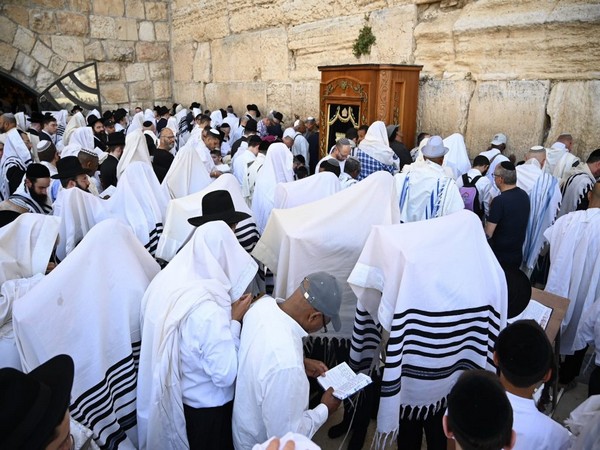Neither war nor a heatwave prevented Jews from thronging to the Western Wall in Jerusalem on Thursday for the traditional priestly blessing, the first since Hamas’s October 7 attack.
Rachel and Nissim, a married couple in their 60-s from Holon in central Israel, recounted their journey to the Western Wall, noting the challenges posed by the security situation.
“My brother advised us against coming this time, but I felt that it’s all in God’s hands,” Rachel told The Press Service of Israel. “We haven’t come here for a few years, but this time, the people of Israel need the blessings now more than ever, and we need the success to end the war and return the hostages safely. It’s paramount for us to be united in that intention right now.”
Miriam, a 40-year-old mother of two from Kiryat Gat in southern Israel, and of Ethiopian descent, arrived at the Western Wall with her two children, ages six and eight, traveling by bus to be present.
“I don’t come here every year for the ceremony, it’s complex with all the logistics and far away,” she told TPS-IL. “This year, however, I came because the children are also a bit older and for their education it is important that they come and see and receive the blessing, especially now at this time.”
The priestly blessing is a traditional benediction given by kohanim, the descendants of Aharon the Priest and takes place during major Jewish festivals. For Israelis and tourists alike, the event is a holiday high point. According to the Western Wall Heritage Foundation, which administers the holy site, more than 30,000 people came for the morning blessings.
This year, special prayers were added for the safety of 133 Israelis being held hostage in Gaza, the protection of Israeli military personnel, and gratitude for protection from a recent missile attack by Iran.
“We remember and pray for our brothers and sisters who are still captives in Gaza, our brothers and sisters who cannot live in their homes because of the enemy’s shelling, and our brothers and sisters who nurse the their wounded and burying their dead,” said Rabbi Shmuel Rabinovitch, the Chief Rabbi of the Western Wall and the Holy Places.
“At the same time, we thank God that last week we faced a missile attack the likes of which the world has not seen – and by God’s grace no one was hurt,” Rabbi Rabinovitch said. “It is our duty at this time to say thank you to the Creator of the world.”
Iran launched more than 320 drones and missiles at Israel in a mid-April attack. According to the Israel Defense Forces, 99% were intercepted by the American, Jordanian British, French and Israeli air forces or by Israeli air defence systems.
Among the attendees were the families of the hostages, Israel’s two Chief Rabbis, and the US Ambassador to Israel.
Off towards the side, trying to avoid the crowd, Tali, a teenage religious school student told TPS-IL she simply came with her friend to share the priestly blessing.
“We will just pray from here and hear the blessing and then quickly get to the light train to catch up with our friends for holiday activities,” Tali said. “Especially on such a day, on this holiday it’s a privilege to pray at such occasion, so that we all will receive good news at last.”
The Temple Mount, where the First and Second Jewish Temples were built, is the overall holiest site in Judaism. The Western Wall is the only remnant of a retaining wall encircling the Temple Mount built by Herod the Great in the first century and is the holiest site where Jews can freely pray.
At least 1,200 people were killed and 240 Israelis and foreigners were taken hostage in Hamas’s attacks on Israeli communities near the Gaza border on October 7. Around 30 of the remaining 133 hostages are believed dead.-ANI/TPS



